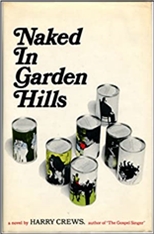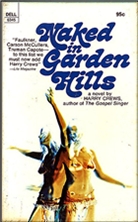Mon 29 May 2023
Reviewed by Tony Baer: HARRY CREWS – Naked in Garden Hills.
Posted by Steve under Reviews[4] Comments
HARRY CREWS – Naked in Garden Hills. William Morrow, hardcover, 1969. Dell, paperback, January 1970.
Fat Man’s dad was an imbecile. They lived in a decrepit shack on two acres of dead dirt in the fraudulently named Garden Hills. So when the phosphate magnate came to town, buying up all the hillbilly land, everybody sold but dad. And dad refused every offer that came — til he got a contract. And he signed the contract. For fifty grand for every year the phosphate mine mined.

Dad was still dumb, though. He builds a castle in the phosphate mill town, and runs around nude all over, screaming about wanting to get turned into phosphate, til one day he jumps in the grinder and his wish comes true.
So now Fat Man’s got all this money. But he’s got nuthin’ to do. Except eat.
So he eats. But then he gets so he can’t move so good. He’s five feet tall and five hundred pounds. He can’t move.
So he hires this midget named Jester. Jester was a jockey til his horse committed suicide by running full speed into a brick wall. Ending Jester’s racing career.
Jester’d been riding a rocking horse in a full jockey suit atop a dunk tank at the freak fair. Jester became conjugally entwined with the peep show gal who smoked cigarettes from her hoohaa.
So Jester and his smoky lass came to town to serve the Fat Man.
Jester acquires a sickly, stickly farm horse, to whom he likes to converse.
“You know about orange groves?â€
“Of course I do, you jockey.â€
“This orange grove is about five acres big, full of little stunty, ragged trees eat up with weeds. And them trees got fruit, juicy as baseballs. But what this man does is he buys great big oranges big as my head, buys’m in California and gets’m brought in on a airplane and puts them out in front of them stunty trees. People coming down the pike caint buy’m fast enough. He’s famous as the Lord. They say he grows the sweetest fruit in America. Weren’t long before he put in melons, plums, grapefruits, even grapes. All off them five acres of stunty trees…… And that’s what we talk about……the horse and me. You see?â€
Jester dresses and feeds and bathes the Fat Man.
Then the phosphate runs out and the money stops.
And the town starts to go bankrupt, like every spent mining town. And the people start to leave.

Fat Man doesn’t wanna move. So he subsidizes the town — the twelve families that remain in this town bereft of commerce, on untillable land.
And then his bread begins to wane. And now the town’s Phosphate Queen’s (that’s the local beauty pageant) been to NYC and come back from her strip-clubbing with an idea that may save the town of Garden Hills. You see, when Dolly the Phosphate Queen came to NYC, she had no money. She just figured she could trade her body for wealth. So she took off her clothes in downtown Manhattan but nobody cared, no one said a word, no one wanted her, no one took her. But then she got in a cage at a Go Go club and took her clothes off there, and folks couldn’t stick cash in her garter fast enough.
So she figured all they had to do was have a big ole sign on the highway advertising a freakish go-go, and people will come from miles around just to see what’s what. Like Dolly points out, roadside zoos are just putting cows and deer and raccoons and possum and horses and rabbits and chickens in cages and making people pay to see ‘em labelled in a cage. These are the same animals that the same travelers have been seeing for free on the side of the road the entire trip. But no. That’s not how we like to see things. We’d pay to see ‘em up close, labelled, in a cage.
So she’s got her go go girls in cages, with her pickins from the townies. And she’s got the jockey riding the smoking vagina.
But what she really needs is the Fat Man.
And so she starves him out. She pesters him til he finances her plan to save the town, ignorant of her conniving.
So she spends the Fat Man’s very last cent converting the phosphate factory into a giant off-highway Go Go Club and Freak Show. Painted red.
And then the food stops coming to the Fat Man, and the Jockey quits helping him and the Fat Man is all alone in his house, no one to dress him, no one to cook for him, no one to bathe him.
And they barbeque a barbeque and stick the prime rib in the Fat Man’s cage.
And wait.
———————————-
Redneck southern swamplands. You’ve seen it before if you’ve read Harry Crews before. Trailer trash freaks behaving freakishly. My only other reads of Harry Crews have been The Gospel Singer and Feast of Snakes. I’d put this one on a par with those, if less dark and perhaps more of a parable. But I couldn’t tell you what the parable is. It just feels like there’s some symbolism here and that Harry Crews doesn’t know what it is either. Each of these three novels have bizarre occurrences of biblical proportions involving snakes, gospel singers, and circus freaks.
But what I personally enjoy about these parables is that they have no moral. Nor morals. Noir morals. And confusion prevails. Which suits me.
I would say ‘if it sounds like your thing, it probably is, and if it sounds like it’s not, it’s not.’ But the point is moot. The book has never been reprinted (*), and it’s selling for hundreds of dollars a copy. It’s not available online anywhere either.
The only way I was able to read it was thanks to the good folks at the New York Public Library system who have a single copy that they will scan for you if you ask nicely. For 20 pages at a time.
It was worth it.
___
(*) [UPDATE.] See comment #2.
May 29th, 2023 at 9:05 pm
I have to be in a mood I am seldom in for Crews, but no one can question he writes the Southern Gothic in a way no one else approaches.
May 30th, 2023 at 9:02 am
I’m a big Crews fan and think I have all of his novels in one form or another. My copy of this one is a Dell reprint from 1970
May 30th, 2023 at 9:44 am
Michael,
Yes, it does look like the Dell mass market paperback came out January 1970 with a 95 cent price tag on the cover. I don’t see copies for sale on Abe though. And doesn’t appear to have been printed since then. Wonder how many copies of the Dell are hanging around. https://www.goodreads.com/book/show/1610823.Naked_in_Garden_Hills
May 30th, 2023 at 10:12 am
Thanks, Michael and Tony. I’ve added the existence of the Dell paperback to the top of the review, along with the Goodreads image of it. Looking online using Bookfinder, I couldn’t fine a single copy of it being offered for sale by anybody. For whatever reason, it’s almost as though it never existed. Congrats, Michael, for having a copy!